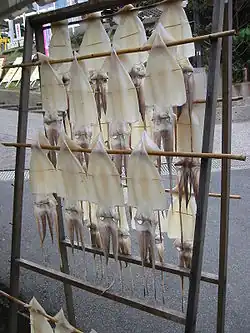鯣烏賊
Japanese
| Kanji in this term | ||
|---|---|---|
| 鯣 | 烏 | 賊 |
| するめ Hyōgaiji |
いか | |
| Jinmeiyō | Grade: S | |
| kun’yomi | jukujikun | |

鯣烏賊 (surume ika): the Japanese flying squid set out for drying, after gutting, cleaning, and butterflying.
Etymology
Compound of 鯣 (surume, “squid used for drying”) + 烏賊 (ika, “squid”).
After the sense of 鯣 (surume) shifted from "type of squid used for drying" to refer more to the end product in the early 1300s,[1] this term surume ika arose to refer unambiguously to the squid rather than the product. First attested in 1787.[2]
Noun
鯣烏賊 • (surume ika)
- a Japanese flying squid (Todarodes pacificus)
- Synonym: (less common) するめ (surume)
References
- “鯣”, in 日本国語大辞典 (Nihon Kokugo Daijiten, “Nihon Kokugo Daijiten”) (in Japanese), 2nd edition, Tōkyō: Shogakukan, 2000, →ISBN
- “鯣烏賊”, in 日本国語大辞典 (Nihon Kokugo Daijiten, “Nihon Kokugo Daijiten”) (in Japanese), 2nd edition, Tōkyō: Shogakukan, 2000, →ISBN
- 2006, 大辞林 (Daijirin), Third Edition (in Japanese), Tōkyō: Sanseidō, →ISBN
This article is issued from Wiktionary. The text is licensed under Creative Commons - Attribution - Sharealike. Additional terms may apply for the media files.